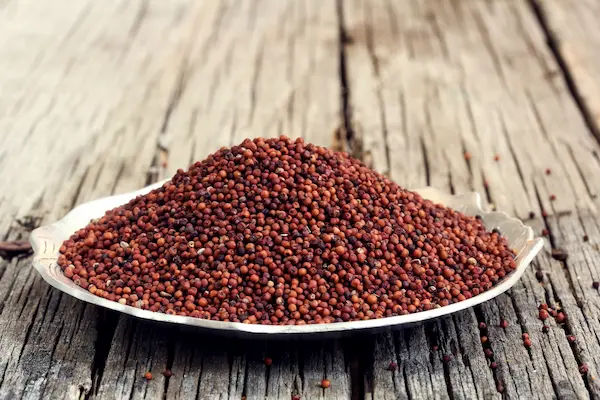Fennel Seeds: Uses and Health Benefits
Know all about fennel seeds, their nutritional value, health benefits, precautions, side effects, and how to use fennel seeds.


Introduction
Fennel seeds, with their sweet, liquorice-like flavour, are more than just a kitchen spice—they are a powerhouse of health benefits. These tiny seeds have been used for centuries in traditional medicine and cooking, offering relief from digestive issues, boosting immunity, and even promoting heart health.
If you’ve ever wondered why fennel seeds are so popular in Indian households or why they are often served after meals, this article will explain their many uses and benefits in simple, easy-to-understand terms.
What Are Fennel Seeds?
Fennel seeds come from the fennel plant (Foeniculum vulgare), a flowering herb native to the Mediterranean region but now grown worldwide. They are small, greenish-brown seeds with a slightly sweet and aromatic taste.
In India, they are commonly known as saunf and are often chewed after meals to freshen breath and aid digestion.
Consult a Nutritionist for Personalised Advice
Nutritional Value of Fennel Seeds
Fennel seeds are packed with essential nutrients, including:
Fibre (supports digestion)
Vitamin C (boosts immunity)
Potassium (regulates blood pressure)
Calcium (strengthens bones)
Iron (prevents anaemia)
Antioxidants (fight free radicals)
These nutrients make fennel seeds a great addition to your diet for overall well-being.
Health Benefits of Fennel Seeds
1. Aids Digestion
One of the most well-known benefits of fennel seeds is their ability to improve digestion.
They contain compounds that relax the digestive tract, reducing bloating, gas, and stomach cramps.
Chewing a teaspoon of fennel seeds after meals can help prevent indigestion and acid reflux.
2. Relieves Constipation
Fennel seeds act as a natural laxative due to their fibre content.
Drinking fennel tea or soaking seeds in water overnight and consuming the water in the morning can help regulate bowel movements.
3. Reduces Bad Breath
Fennel seeds have antibacterial properties that fight germs in the mouth, freshening breath naturally.
This is why they are often served as a mouth freshener in restaurants.
4. Supports Heart Health
The potassium in fennel seeds helps regulate blood pressure, while fibre and antioxidants reduce bad cholesterol (LDL), lowering the risk of heart disease.
5. Boosts Immunity
Rich in vitamin C and antioxidants, fennel seeds strengthen the immune system, helping the body fight infections like colds and flu.
6. Helps in Weight Management
Fennel seeds act as an appetite suppressant and improve metabolism.
Drinking fennel tea can help control cravings and support weight loss efforts.
7. Regulates Blood Sugar
Studies suggest that fennel seeds may help lower blood sugar levels, making them beneficial for people with diabetes. However, always consult a doctor before using them as a remedy.
8. Improves Skin Health
The antioxidants and anti-inflammatory properties of fennel seeds help reduce acne, slow ageing, and give the skin a healthy glow.
Applying fennel seed paste or drinking fennel water can improve skin texture.
9. Eases Menstrual Discomfort
Fennel seeds have compounds that mimic estrogen, helping reduce menstrual cramps and regulating periods. Drinking fennel tea can provide relief from PMS symptoms.
10. Promotes Lactation in Nursing Mothers
Fennel seeds are known to increase milk production in breastfeeding women. Consuming fennel tea or adding seeds to meals can be beneficial for new mothers.
How to Use Fennel Seeds?
Fennel seeds can be consumed in various ways:
Chew raw seeds (½ to 1 tsp after meals).
Make fennel tea (steep 1 tsp crushed seeds in hot water for 5-10 minutes).
Add to dishes (soups, curries, salads, and baked goods).
Use fennel water (soak seeds overnight and drink the water in the morning).
Precautions & Side Effects
While fennel seeds are generally safe, excessive consumption may cause:
Allergic reactions in some people
Hormonal effects (avoid in large amounts during pregnancy)
Interaction with certain medications (consult a doctor if on blood thinners or estrogen therapy)
When to See a Doctor?
If you experience severe digestive issues, persistent bloating, or allergic reactions after consuming fennel seeds, it’s best to consult a healthcare professional.
Final Thoughts
Fennel seeds are a simple yet powerful natural remedy for many common health issues. Whether you use them for digestion, immunity, or skin health, incorporating them into your daily routine can bring multiple benefits. Start with small amounts and observe how your body responds.
Consult a Nutritionist for Personalised Advice
Consult a Nutritionist for Personalised Advice

Dr. Ramalinga Reddy
General Physician
5 Years • MBBS MD General medicine
Bengaluru
PRESTIGE SHANTHINIKETAN - SOCIETY CLINIC, Bengaluru
Dt. Ila Sharma
Clinical Nutritionist
18 Years • Master in food & Nutrition
Gurugram
VIPUL GREENS - SOCIETY CLINIC, Gurugram
Ms. Bhavana Shetty
Dietician
7 Years • DDHN & Masters in Clinical Nutrition & Dietetics
Bangalore
Apollo Sugar Clinic, Seetha circle bangalore, Bangalore
Dr Sumanth R
General Physician
2 Years • MBBS
Bengaluru
PRESTIGE SHANTHINIKETAN - SOCIETY CLINIC, Bengaluru
Mrs Sneha P V
Nutritionist
10 Years • Master of science in Food and Nutrition
Bangalore
Apollo Clinic Bellandur, Bangalore




